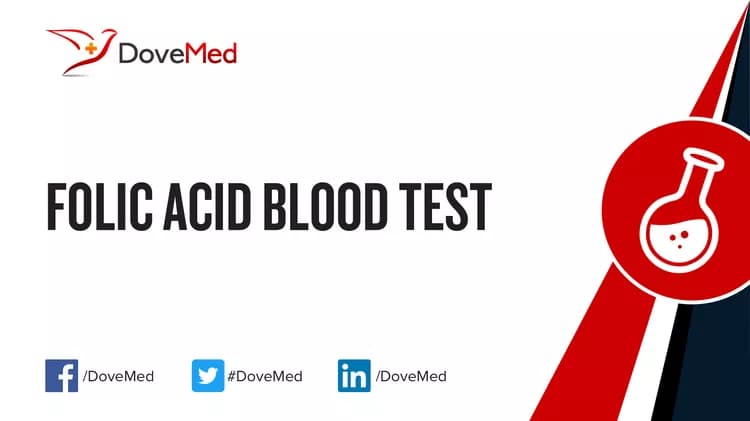What are the other Names for this Test? (Equivalent Terms)
- RBC Folate Blood Test
- Red Blood Cell Folate Blood Test
- Vitamin B9 Blood Test
What is Folic Acid Blood Test? (Background Information)
- Folic acid or folate, also called vitamin B9, is part of the B complex of vitamins. It is important for red blood cell production, red blood cell and white blood cell function, nervous system health, and tissue repair. Vitamins, such as vitamin B9, are essential because certain enzymes require them to perform necessary chemical reactions
- Folate is obtained from bacteria in the intestines and from the diet. Foods rich in folate include leafy green vegetables, beans, citrus fruits, liver, and yeast. Foods and beverages are often supplemented with folic acid. Folate refers to the natural form of the vitamin, whereas folic acid is added to food and beverages
- Folate is water-soluble, which means that most folate is excreted through the urine and does not get stored in body fat. However, small amounts of folate are stored in the liver
- One of the most important uses for folate is red blood cell production, or erythropoiesis. This occurs in the bone marrow. Folate deficiency may lead to the production of fewer but larger red blood cells, which is a type of anemia
- Additionally, folate deficiency could cause developmental defects in a growing fetus. This is because folate is necessary for cell division, which occurs at a rapid rate during fetal growth and development
- 95% of folate is housed in red blood cells. These cells make up one-third to one-half of the volume of blood; the rest is fluid called plasma. 99% of all blood cells are red blood cells
- Individuals with malabsorptive disorders, such as celiac disease and cystic fibrosis, may have difficulties in absorbing folate, even though they eat foods rich in folate
- The Folic Acid Blood Test measures folic acid or folate levels in either the blood plasma or in the red blood cells. It is used to identify a folate deficiency, which could indicate other conditions such as malabsorptive disorders or malnutrition
What are the Clinical Indications for performing the Folic Acid Blood Test?
Following are the clinical indications for performing the Folic Acid Blood Test:
- Differentiating megaloblastic anemia resulting from deficient folate intake or increased folate requirement
- Monitoring the effects of prolonged parenteral nutrition
- Fatigue
- Pale appearance
- Irregular heartbeat
- Altered mental status
- Headache
How is the Specimen Collected for Folic Acid Blood Test?
Following is the specimen collection process for Folic Acid Blood Test:
Sample required: Blood
Process of obtaining blood sample in adults:
- A band is wrapped around the arm, 3-4 inches above the collection site (superficial vein that lies within the elbow pit)
- The site is cleaned with 70% alcohol in an outward spiral, away from the zone of needle insertion
- The needle cap is removed and is held in line with the vein, pulling the skin tight
- With a small and quick thrust, the vein is penetrated using the needle
- The required amount of blood sample is collected by pulling the plunger of the syringe out slowly
- The wrap band is removed, gauze is placed on the collection site, and the needle is removed
- The blood is immediately transferred into the blood container, which has the appropriate preservative/clot activator/anti-coagulant
- The syringe and the needle are disposed into the appropriate “sharp container” for safe and hygienic disposal
Preparation required: No special preparation is needed prior to the test.
What is the Significance of the Folic Acid Blood Test Result?
The significance of the Folic Acid Blood Test result is explained:
- Increased folate levels may indicate:
- Vitamin B12 deficiency
- Blind loop syndrome
- Distal small bowel disease
- Pernicious anemia
- Decreased folate levels may indicate:
- Crohn’s disease
- Exfoliative dermatitis
- Hemolytic anemia, megaloblastic anemia, or sideroblastic anemia
- Infantile hyperthyroidism
- Liver disease
- Malnutrition
- Myelofibrosis
- Neoplasmus
- Regional enteritis
- Scurvy
- Sprue
- Ulcerative colitis
- Whipple’s disease
The laboratory test results are NOT to be interpreted as results of a "stand-alone" test. The test results have to be interpreted after correlating with suitable clinical findings and additional supplemental tests/information. Your healthcare providers will explain the meaning of your tests results, based on the overall clinical scenario.
Additional and Relevant Useful Information:
- The Folic Acid Blood Test is rarely ordered in the United States. The homocysteine and methylmalonic acid (MMA) tests are often ordered alongside the folate test. Elevated homocysteine levels, but not MMA levels, would indicate a folate deficiency
- Sometimes, the Folate Blood Test is ordered along with a vitamin B12 test
- Individuals who are pregnant, in early childhood, or who have cancer may require increased amounts of folate
- Certain factors influence the results of this test and these include diet, alcohol consumption, pregnancy, body composition, and smoking
Certain medications that you may be currently taking may influence the outcome of the test. Hence, it is important to inform your healthcare provider of the complete list of medications (including any herbal supplements) you are currently taking. This will help the healthcare provider interpret your test results more accurately and avoid unnecessary chances of a misdiagnosis.
Please visit our Laboratory Procedures Center for more physician-approved health information:
http://www.dovemed.com/common-procedures/procedures-laboratory/
Related Articles
Test Your Knowledge
Asked by users
Related Centers
Related Specialties
Related Physicians
Related Procedures
Related Resources
Join DoveHubs
and connect with fellow professionals


0 Comments
Please log in to post a comment.